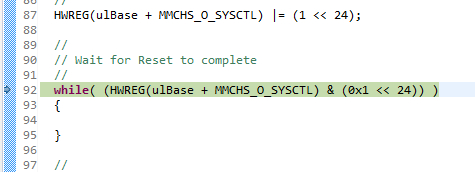Other Parts Discussed in Thread: TEST2, CC3200, SYSCONFIG
Hi,
I recently encountered an issue about micro SD card operation. My project uses CC3235MOD LaunchPad and micro SD Card BoosterPack, adopted the "sdraw" example code in the SDK. What the project does is do some SD card R/W operation then hibernate a while, then does it again. But it sometimes dead in the SD_open() about 1/5 probability.
The hardware connection followed the example code, no change. I use less than 5cm jumping wire and I pretty sure it’s a stable connection. SD clk runs at 8MHz, no change from the example code as well.
Software: the usage followed the example code as SD_init(); SD_open(); SD_initialize(); SD_write(); SD_read(); SD_close(). All the read and write operation is fine, no error occured.
When it goes wrong, it always stucked in the file sdhost.c shown as below:

This problem has bothered me for quite some time. It does not look like a connection issue since R/W never goes wrong. Please help and give me some idea to fix it. Thanks in advance!
P.S. the version of SDK is simplelink_cc32xx_sdk_4_30_00_06


